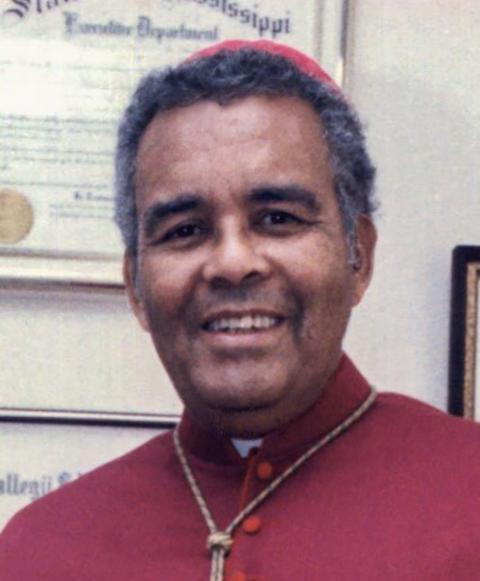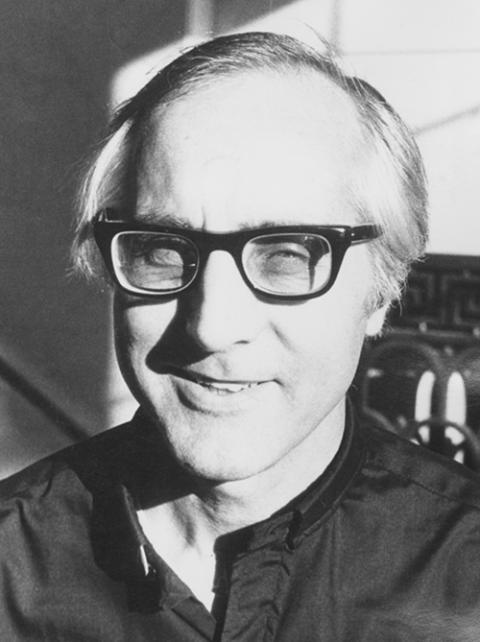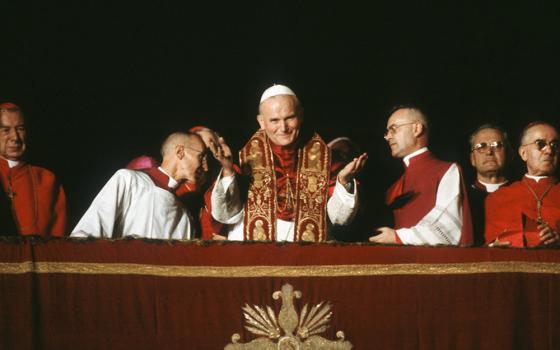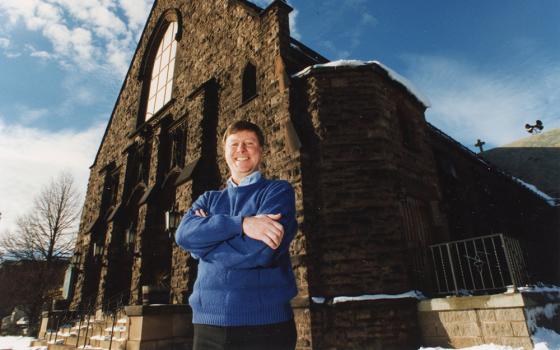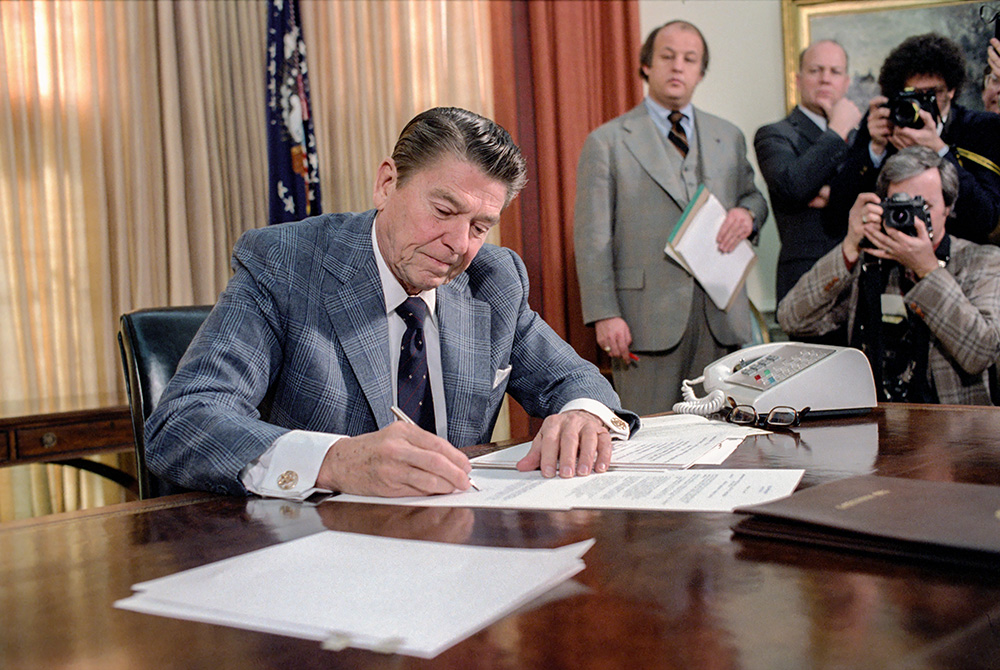
President Ronald Reagan signs an executive order on reductions in government spending in the Oval Office in the White House in Washington, D.C., on Jan. 22, 1981, two days after his inauguration. (U.S. National Archives and Records Administration)

(NCR logo/Toni-Ann Ortiz)
It is the beginning of a new administration and the U.S. bishops' conference suddenly is bitterly at odds with an incoming president on many issues. But in agreement on others.
It is not 2025, but 1981, and National Catholic Reporter's correspondent in Washington previewed the incoming administration. Bishops were miffed with President Ronald Reagan over military aid to El Salvador, cuts in social spending and defense spending. But Reagan was on their side on abortion and tax support for parochial schools.
Bishop Thomas Gumbleton of Detroit told NCR, "I hope we don't just sit back" and ignore the social issues.
For our 60th anniversary, we republish this article and remind that church-state relations can be complex.
U.S. bishops, Reagan 'head for conflict' on military, justice issues
Jan. 16, 1981
By JAMES W. MICHAELS JR.
Washington Bureau Chief
WASHINGTON — U.S. CATHOLIC church leaders appear headed for an early clash with the incoming Reagan administration about a major foreign policy issue: military aid to El Salvador.
A similar clash appears imminent when Reagan begins cutting back social welfare programs in an attempt to curb inflation.
The Reagan administration probably will renew $5 million in military aid that was recently cut off by President Carter following the killings of four U.S. missionaries in that Central American country, say observers. U.S. Catholic leaders, meanwhile, have met with Carter and Secretary of State Edmund Muskie in an attempt to continue the ban.
In the domestic field, Reagan advisers have recommended severe federal spending cuts in all areas except defense, in an attempt to curb inflation. Social welfare programs already under intense fire will probably get hit hard. The church's job, say officials at the bishops' administrative arm in Washington, the U.S. Catholic Conference (USCC), is to insure that the poor are not hurt the most by these cuts.
Advertisement
"We don't want to put the burden of the economy on those that can least afford it," explained USCC social development and world peace department chairman Monsignor Francis J. Lally. A bishops' administrative board statement issued last year put it this way: economic policies "which attempt to reduce inflation by cutting back on human needs programs or by increasing unemployment are simply unacceptable."
But the church finds itself in this position immediately following severe budget reductions in the USCC offices which deal in foreign and domestic social issues. At the bishops' meeting last May, they approved budget cuts that severely reduced staffs in the USCC education and social development and world peace departments, while leaving other departments relatively untouched.
Because of the cuts, "the quantity of our output is bound to decline" at a time when the church's voice especially needs to be heard, said one social development and world peace staffer.
But others said it is more important to develop parish and local level support, rather than presenting positions without popular support among Catholics.
"There are many beautiful documents coming out of the USCC," said Auxiliary Bishop Joseph Francis of Newark, N.J. "But unless it's taken by people at the local level" the positions will have little influence on government.
Newly conservative Washington appears not to be all bad for Catholic church interests. USCC government liaison James Robinson called the new Congress and administration a "mixed blessing." While the bishops may disagree with the incoming administration and Congress about a broad range of social issues, on the so called "institutional issues" — mainly tuition tax credits and abortion — the church seems to be closer to its goals with the new government than ever before.
Reagan announced support for a constitutional amendment banning abortion. And he supports tuition tax credits for parents of private school pupils.
Some observers privately expressed worry that the USCC and other groups may mute their criticism on the social issues to press the tuition tax credits and abortion stands, which have been a top priority for years. "I hope we don't just sit back" and ignore the social issues, because of the church's compatibility with the new administration on abortion and tuition tax credits, said Auxiliary Bishop Thomas Gumbleton of Detroit, a longtime peace activist.
Other issues at the heart of the bishops' political agenda include:
— Arms control. SALT II is dead, most observers say. Reagan has not yet given any indications what path he will follow to control the spread of arms.
— Foreign policy and human rights. Recently a group of religious leaders signed a statement asking Reagan to clarify his human rights position. The religious statement came in the wake of reports that dictators in Latin America and elsewhere were reading the Reagan election as a license to step up repression.
Reagan advisers have indicated they will emphasize human rights less and nationalist or strategic interests more in their foreign policy decisions.
— Capital punishment. The bishops are on record opposing any form of the death penalty. The new Senate Judiciary Committee chairman, Strom Thurmond (R. S.C.), said he supports the death penalty for some crimes. This is likely to come up in the new Congress.
— Civil rights. The Voters Rights Act of 1965 will be up for renewal in 1982, and some conservatives in Congress have already threatened to abolish or amend the act. The act allows the federal government to monitor voter registration in some areas and outlaws such practices as literacy tests and poll taxes which were used often to keep blacks from voting.
— Social programs. One of the first items of business for the new administration will be the economy. Already Reagan advisers are recommending across-the-board federal spending cuts in all areas except defense in the hope of curbing inflation.
Favorite targets for budget cuts are Social Security and food stamps. Because the benefits of these programs are tied to the cost of living, they are considered to be inflationary.
The bishops, USCC staff were quick to note, cannot go back on their positions. This will mean the USCC and other Washington religious groups with similar views may find themselves being among the few powerful organizations looking after the interests of the poor and the powerless in this country and elsewhere in a time of budget cuts and tax cuts in domestic policy; and military jingoism in foreign affairs.
USCC officials said access to the new administration will be no problem. "A great many Catholics voted for this administration. They will want to hear from us," insisted USCC's Lally.
And judging from their interventions at the bishops' November meeting, many bishops are showing increasing concern for social justice issues such as arms control. The bishops "are going to see that there is a vocal and clear concern for the poor," said Ronald Krietzmeyer, a USCC staff person in charge of the domestic social development office.
Detroit's Gumbleton agreed. "There's much more a sense of concern on these sorts of (social justice) issues than there was several years ago," Gumbleton told NCR.
But the real question, some observers say, remains whether the bishops will put as much effort into pressing their social justice agenda as they have on abortion and tuition tax credits, which have more support among Catholics. To Capitol Hill legislators, the church still is identified primarily with institutional concerns.
Signals for the future are mixed. The church has taken a leading role in pressing for a ban on military aid to El Salvador, a unique move, say church observers. But cuts in the USCC budget in the department dealing with foreign and domestic social issues seem to indicate a shift away from broader public policy concerns.
But some religious leaders say the problem now is getting support for the leadership's position rather than pressing them on a national level. "That's where the job of the church is going to be," said Gumbleton, "bringing our people to this kind of an awareness." Without a strong base support, church positions carry little weight among legislators, he added.

